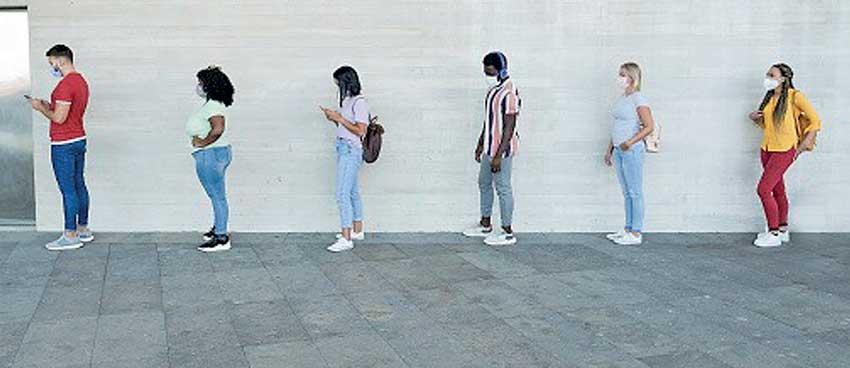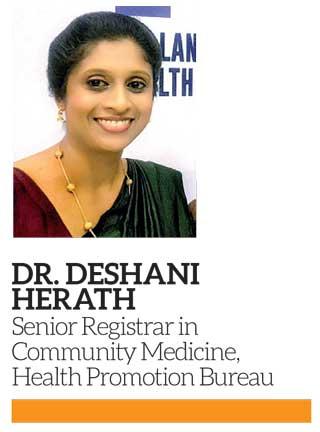12 Nov 2021 - {{hitsCtrl.values.hits}}

An end to the Covid-19 pandemic is envisaged by many. Given the nature of the pandemic, which has already resulted in the loss of more than five million lives globally, it is important to note that the potential to put a stop to the pandemic lies within the actions of the members of a community itself.
‘The best way to understand the importance of Covid Appropriate Behaviours (CAB) is to understand the theory behind - why do we practice CAB?’ mentions Dr Deshani Herath, Senior Registrar in Community Medicine, Health Promotion Bureau. ‘In general, infected persons can spread COVID-19 to another person through droplets whenever they breathe, talk, sneeze or cough. These virus particles range from respiratory droplets to very small aerosols and can weigh anywhere between five to ten micrometers in diameter which are heavier as compared to other airborne particles’. The doctor continued to explain that since Covid-19 droplets are heavier in weight they are pulled down by gravity before they travel a distance of one to two metres.
 The virus can also spread in poorly ventilated, closed and confined spaces where people tend to remain longer periods of time as aerosols remain suspended in the air for a longer period of time. ‘Therefore, avoid crowded and confined spaces so that the chances of contracting the virus through the droplets and aerosols are less’ says Dr Deshani. Additionally, Dr Deshani also highlights that it is important to continue to exercise all Covid Appropriate Behaviors (CAB) such as maintaining social distance, wearing a proper face mask and regularly washing hands to avoid all possibilities of contracting the virus.
The virus can also spread in poorly ventilated, closed and confined spaces where people tend to remain longer periods of time as aerosols remain suspended in the air for a longer period of time. ‘Therefore, avoid crowded and confined spaces so that the chances of contracting the virus through the droplets and aerosols are less’ says Dr Deshani. Additionally, Dr Deshani also highlights that it is important to continue to exercise all Covid Appropriate Behaviors (CAB) such as maintaining social distance, wearing a proper face mask and regularly washing hands to avoid all possibilities of contracting the virus.
When asked about the best ways to curb the spread of the virus, Dr Deshani mentioned that ‘currently there is substantial data and evidence to show that vaccination reduces the transmissibility of the virus from one person to another and thereby reduces the spread of the virus’. The vaccine benefits the human body with an added layer of clinically proven defensive measures to fight the COVID virus. ‘Even though you might be infected, COVID vaccine appears to reduce the risk of developing sever or any fatal conditions following the disease’ says the Dr Deshani.
Commenting about the various misconceptions that people generally tend to have about the vaccines, Dr Deshani mentions that all vaccines available in Sri Lanka possess an efficacy rate ranging from 60% to 95% and have undergone strict, scientific trials and procedures before being made available to the general public and mass administration. ‘All medications may impose a moderate to severe side effect risk depending on each individual. The vaccine against Covid-19 has very minimal side effects and its benefits out-weigh its possible disadvantages’.
Dr Deshani also highlights the importance of remaining vigilant when associating members within closely-knit communities such as from the workplace or even at houses. ‘A recent study commissioned by the Centre for Evidence based Medicine in Oxford shows that 5% - 80% of all Covid-19 positive patients might remain asymptomatic’. Therefore, it is important to practice CAB at all places, at all times and at all set-ups to remain safe from contracting the virus.
The actions and behaviors of members of a community have the highest potential to navigate the future trajectory of the pandemic. Adhering to proper Covid Appropriate Behaviors (CAB) even after getting vaccinated will minimize the avenues that the virus can utilize to populate and to generate further mutations and transmissions. ‘Pandemics do not come with an expiry date’ says Dr Deshani while stressing the importance of continuing to adhere Covid Appropriate Behaviors (CAB).
(This article is part an awareness campaign conducted jointly by the Health Promotion Bureau of the Ministry of Health, the World Bank and UNICEF to shed light on essential information in relation to Covid-19, the importance of Covid Appropriate Behaviour (CAB) and the need to continue prevention measures after vaccination.)
20 Dec 2024 9 hours ago
20 Dec 2024 20 Dec 2024
20 Dec 2024 20 Dec 2024
20 Dec 2024 20 Dec 2024
20 Dec 2024 20 Dec 2024